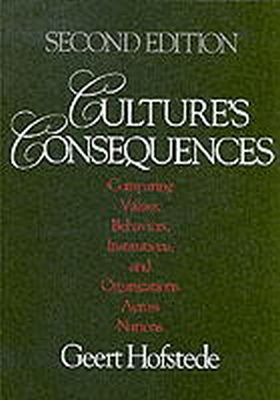
Stock image for illustration purposes only - book cover, edition or condition may vary.
Culture's Consequences
Geert Hofstede
FREE Delivery in Ireland
Description for Culture's Consequences
Paperback. 'The publication of this second edition of Culture's Consequences marks an important moment in the field of cross-cultural studies!. Hofstede's framework for understanding national differences has been one of the most influential and widely used frameworks in cross-cultural business studies, in the past ten years' - Australian Journal of Management Num Pages: 616 pages. BIC Classification: JH. Category: (P) Professional & Vocational; (U) Tertiary Education (US: College). Dimension: 252 x 177 x 33. Weight in Grams: 1026.
"An important, sophisticated and complex monograph . . . Both the theoretical analysis and the empirical findings constitute major contributions to cross-cultural value analysis and the cross-cultural study of work motivations and organizational dynamics. This book is also a valuable resource for anyone interested in a historical or anthropological approach to cross-cultural comparisons."
--PERSONNEL PSYCHOLOGY
--PERSONNEL PSYCHOLOGYThe Second Edition of this classic work, first published in 1981 and an international best seller, explores the differences in thinking and social action that exist among members of more than 50 modern nations. Geert Hofstede argues that people carry "mental programs" which are developed ... Read morein the family in early childhood and reinforced in schools and organizations, and that these programs contain components of national culture. They are expressed most clearly in the different values that predominate among people from different countries.
Geert Hofstede has completely rewritten, revised and updated Culture′s Consequences for the twenty-first century, he has broadened the book′s cross-disciplinary appeal, expanded the coverage of countries examined from 40 to more than 50, reformulated his arguments and a large amount of new literature has been included. The book is structured around five major dimensions: power distance; uncertainty avoidance; individualism versus collectivism; masculinity versus femininity; and long term versus short-term orientation.
Show Less
Product Details
Publisher
SAGE Publications Inc United States
Place of Publication
Thousand Oaks, United States
Shipping Time
Usually ships in 4 to 8 working days
About Geert Hofstede
Geert Hofstede received a master’s degree in Mechanical Engineering from the Technical University at Delft and a doctorate in Social Psychology from the University of Groningen, both in his native Netherlands. His professional career includes experience as a worker, foreman, plant manager, chief psychologist on the international staff of a multinational corporation, academic researcher, director of human resources of ... Read moreanother multinational, and university professor. He has been affiliated with IMD (Lausanne, Switzerland), INSEAD (Fontainebleau, France), the European Institute for Advanced Studies in Management (Brussels, Belguim), IIASA (Laxenburg Castle, Austria), and the University of Hong Kong. He is Professor Emeritus of Organizational Anthropology and International Management of Maastricht University, the Netherlands. He is currently a Senior Fellow of the Institute for Research on Intercultural Cooperation (of which he was a founder) and of the Center for Economic Research, both at Tilburg University, the Netherlands. He has lectured at universities and consulted for institutions and companies around the world. Dr. Hofstede’s books have appeared in seventeen languages, and his articles have been published in social science journals around the world. He is among the top 100 most cited authors in the Social Science Citation Index. Show Less
Reviews for Culture's Consequences
"An important, sophisticated and complex monograph. . . . Both the theoretical analysis and the empirical findings constitute major contributions to cross-cultural value analysis and the cross-cultural study of work motivations and organizational dynamics. This book is also a valuable resource for anyone interested in a historical or anthropological approach to cross-cultural comparisons."
PERSONNEL PSYCHOLOGY

